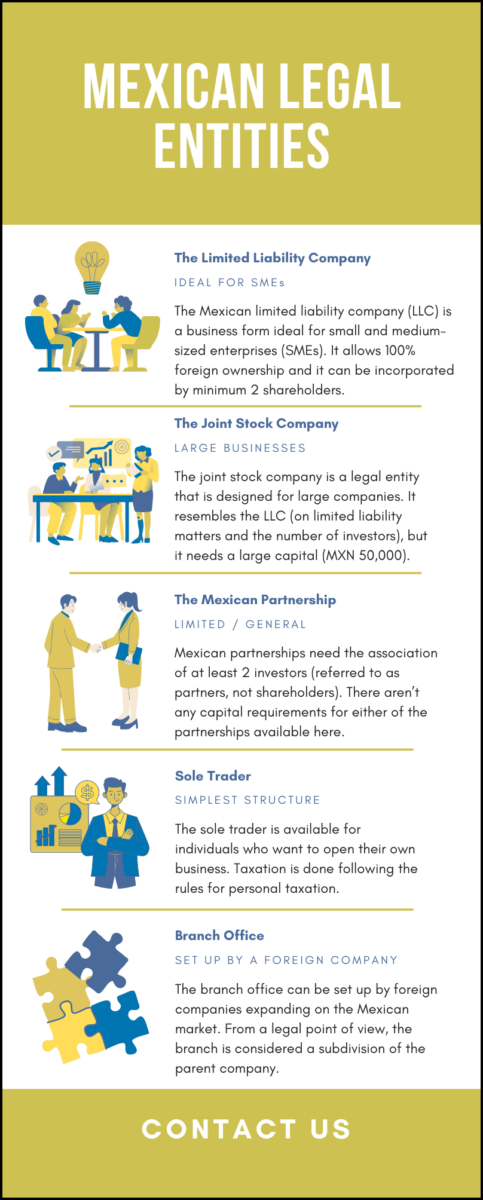Investors in Mexico can choose among several different business forms, according to the size of the company, the plans to expand it, the number of founders and the available paid-up capital.
The general requirements for company incorporation may vary according to the chosen type of company. Our Mexico company formation agents can help you choose the most suitable business type, according to your business needs.
| Quick Facts | |
|---|---|
| Types of legal entities in Mexico | There are many types of companies in Mexico, such as: the limited liability company, the stock company, the general/limited partnership, the sole trader, maquiladoras (factories operating under a special tax regime), the branch office/subsidiary, the representative office, etc. |
|
The characteristics of the LLC |
The LLC refers to the limited liability company (Sociedad de Responsabilidad Limitada), which has the following characteristics: – it is suitable for small and medium-sized companies; – it can be incorporated by minimum 2 shareholders; – the shareholders have limited liability against corporate debts, limited to their investment; – it allows 100% foreign ownership; – the company’s shares can’t be publicly traded; – it can have up to 50 shareholders. |
|
The characteristics of the stock company |
A stock company needs a minimum of 2 shareholders, who acquire ownership by purchasing shares in the company. The shares can be sold and the investors benefit from limited liability. The company requires a capital of MXN 50,000 and it is ideally suited for large companies. |
| The characteristics of the partnership |
Partnerships in Mexico are established by signing a partnership agreement. They need 2 founders, who are referred to as partners. There isn’t any capital requirement for a partnership and the founders bear personal responsibility for the debts of the company. |
| The characteristics of the sole trader |
The sole trader is known as Persona Fisica con Actividad Empresarial. The company can be set up by 1 founder who is a natural person. The entity is taxed following the rules for personal taxation, while the founder is fully liable for company debts. |
| The characteristics of the branch |
A branch is a subdivision of a parent company which is registered for tax purposes in Mexico. It can develop the same business activities of the parent company and it must pay taxes in Mexico for the income generated in Mexico. |
| Legislation regulating company incorporation in Mexico |
All types of companies in Mexico are governed by the Mexican General Law for Commercial Companies. |
| Corporate taxes |
– corporate tax 30%; – VAT 16%, 8% and 0%; – excise tax – varying from 3% to 160% depending on the goods imported in the country; – payroll tax paid by the employer 3%; – social security contribution paid by the employer 2%. |
| Foreign ownership rules |
Foreign investors can set up companies with 100% foreign owernship, with the exception of few economic sectors. |
| Double tax treaties signed by Mexico | 60 |
| Main company registration steps |
For all company types in Mexico, the following steps are necessary: – select a suitable trading name; – prepare the company’s founding document; – subscribe the minimum share capital, where required; – open a bank account at a local commercial bank; – have a registered address; – appoint directors/board of directors/administrators; – register for taxation. |
| Corporate tax number required (yes/no) |
Yes |
| Resident director/shareholder requirements |
No |
| Can investors modify the legal entity of a Mexican company? |
Yes, it is possible to change a legal entity into another, if necessary. |
| Ways in which our team can assist investors |
Our consultants can help you select a suitable legal entity, register it with local authorities, obtain certificates, permits, licenses. They can also assist in any business immigration matter as well as in post-incorporation formalities. |
Main business forms in Mexico
The General Law of Commercial Companies establishes several types of companies that can be constituted in Mexico. These include:
- the general partnership;
- the limited partnership;
- the limited liability company;
- the limited liability stock company, or corporation;
- the association in participation;
- the sole proprietorship.
Investors also have to possibility to set up a company in Mexico as a branch office. Please mind that this structure is not a separate legal entity, in fact, it is seen from a legal point of view simply as an extension of the parent company.
The Mexican Foreign Investment Law allows foreign corporations to establish a branch in Mexico, subject to authorization from the Ministry of Economy. The registration is also mandatory for the branch and it is performed with the Public Registry of Commerce. The foreign company abroad will be fully liable for the debts and obligations incurred by its branch in Mexico.
As such, the branch needs approval from the parent company for a wide array of corporate decisions. These decisions can’t be taken by the local management, because the purpose of the branch is for the parent company to have a great level of control on its overseas operations.
A similar structure to the branch office is the representative office, which is also a type of entity that does not have a separate legal personality from its founders. This structure can’t engage in economic activities, unlike the branch, which has the primary purpose of developing commercial activities following the same business model as the one of the parent.
The procedure to set up a representative office follows a different route than the one available for commercial entities. Investors must first address the State Delegations and Sub-delegations of the Secretariat of Economy operating in different states, or it can be done online, via the System of Legal Affairs for Foreign Investment.
The processing of the request to open a representative office can take around 15 business days, once the applicant company has submitted the required paperwork. Our specialists in company incorporation in Mexico can help you prepare the application file.
Investors in Mexico will typically choose to incorporate a limited liability company or a stock corporation (also referred to as the limited liability stock company). These two business types offer a high degree of investor protection and may be fully owned by foreign investors. We invite you to watch a short video on the Mexican business forms:
Differences between company types in Mexico
Investors choose the most suitable business type according to their business plan, the available capital and whether or not they plan on working together with a partner to develop the business.
Partnerships in Mexico are business forms formed by investors who share the same business goals. The general partnership is established by partners who will co-own the business and will be able to contribute to the business assets as they see fit.
In this business form, all investors have unlimited liability and partners are jointly liable for the debts and obligations of the business. In a limited partnership, one or more partners may benefit from a higher degree of protection (they are not jointly liable for all the debts, like the rest of the general partners, but they are liable according to their asset contributions).
The main types of corporate entities (legal forms that have a separate legal personality from the investors) are the limited liability company and the limited liability stock company. The limited liability company is suited to small or medium-sized businesses and investors are only liable to the extent they have contributed to the capital.
It cannot sell shares and their transferability is restricted. The number of partners is limited to 50. The limited liability stock company shares some characteristics in that the liability is limited to the amount of contributed capital. However, this type of company can sell shares and their transferability is established in the company’s bylaws.
You can set up a company in Mexico as a limited liability company by following the next registration steps:
- draft and sign the company’s bylaws – the document contains the provisions governing the legal entity, information on the shareholders’ shares, rights and obligations, details about the assets of the company and other important matters;
- once the document is signed, it is necessary to register it with the Public Registry;
- considering that the legal entity is set up for commercial purposes, it will need a tax identification number, which is issued by the Federal Taxpayer Registry;
- another compulsory step during the process of company formation in Mexico is obtaining a corporate bank account (at any commercial bank preferred by the investor).
The Law Governing Commercial Companies (or the Mexican General Law for Commercial Companies) contains provisions for the management and control of a Mexican company. The stock corporation can have an unlimited number of shareholders and at least two founding members.
Its management is performed by one or more directors who do not need to be shareholders in the company but are appointed following a Shareholder’s Meeting.
You can address our Mexico company formation agents if you need more details on how to choose the types of legal entities and the special requirements according to the type of business. We can help you throughout the Mexico company registration process.
What are the accounting considerations for Mexican companies?
Investors who will open a company in Mexico are required to abide by the accounting formalities available in this country. While the accounting obligations can vary from one legal entity to another, all Mexican companies need to comply with some accounting procedures and that includes the sole trader as well.
In the list below, our team of consultants in company formation in Mexico present some of the main aspects investors should know on corporate accounting:
- some of the accounting obligations derive from the General Law for Commercial Companies 1934;
- investors must also verify the provisions of the Tax Federation Code 1987;
- the rules of the International Financial Reporting Standards (IFRS) are also applicable in Mexico starting with 2012;
- companies must prepare and keep their financial documentation throughout the entire financial year, which, in Mexico, starts on 1 January and ends on 31 December.
The IFRS, harmonized with the national law of Mexico, have been fully adopted by the National Banking and Securities Commission of Mexico. It must be noted that the Mexican Financial Reporting Standards Board eliminated any differences between the Mexican Financial Reporting Standards and the IFRS, making the 2 systems compatible; our accountants in Mexico can offer additional information.
You can also contact us if you need the services of a CPA in Mexico. These are necessary once a business becomes operational and it takes into consideration numerous accounting matters, such as calculating the taxes due, the employment taxes, the tax deductions, etc.
It can also take into consideration the tax benefits specified in various tax agreements or the tax benefits that can be granted based on the business sector in which the company operates.
Our CPA in Mexico can present in-depth details on any of the tax treaties signed here. Mexico has signed 60 tax treaties and although the stipulations of these tax treaties are generally the same, the tax rates can vary from one country to another.
Thus, you can contact our accountant to discover the main stipulations of a treaty that is of your interest and from which you can obtain different tax benefits.



